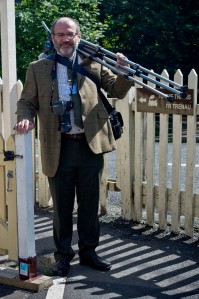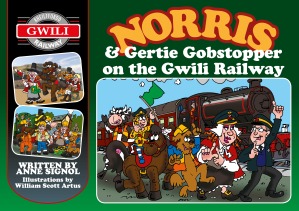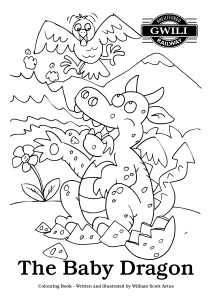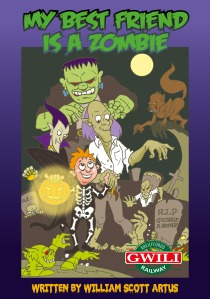
 Today we're meeting a favourite of the previous Book Fairs: Will MacMillan Jones. He will be present at the book fair in teh Shire Hall, Carmarthen Street, between 10:30 am and 4pm and will be reading stories at the Peppercorn Kitchenware Shop at 12:30.
Today we're meeting a favourite of the previous Book Fairs: Will MacMillan Jones. He will be present at the book fair in teh Shire Hall, Carmarthen Street, between 10:30 am and 4pm and will be reading stories at the Peppercorn Kitchenware Shop at 12:30.
Here is our Interview with Will:
Welcome back Will, Please tell us about the books you’ll be bringing to the Book Fair.
Welcome back Will, Please tell us about the books you’ll be bringing to the Book Fair.
I’ll have up to eighteen titles with me, spanning a range of genres. First up: my comic fantasy collection, The Banned Underground. Next the Horror/paranormal series, then some collections of short stories and poetry – these will form the basis of my hour set in The Angel Inn on 20 April as part of the Festival, some childrens’ fantasy books and finally – if it is finished in time – my first Scifi adventure.
The Banned Underground is a comic fantasy collection of stand alone stories, based on the adventures of a dwarf Rock N Roll band and their friends and enemies in a world that is almost our own – well, mainly because it is our own world really. The music just spreads, you know? Full of puns, gags, one liners and even a few subtle jokes; one of which made Jasper Fforde laugh a couple of years ago! Suitable for anyone with a sense of humour (not supplied with book) and a delight in the joy of living.
The Mister Jones Mysteries are an unfolding tale of horror. The unfortunate Mister Jones has been pulled from his comfortable life by horrors raised by his family’s dabbling with the occult. In a series of adventures he slowly learns more about his family’s dark history – and himself. Described by reviewers as tightly written’; ‘oozing a constant stream of dread’; ‘a classic horror style reminiscent of de Maupassant and Denis Wheatley’. Perfect reading by a fireside, while a storm rages outside…
The poetry and short story collections come from two backgrounds. The poetry: I’m a third of The Tin Plate Poets collective from the Gwendraeth Valley. I specialise, I suppose, in the darker themes in my poetry for what poet is not touched by the darkness? I’ve won some awards with my Flash Fiction (that’s stories of less than 1000 words) and these collections contain those and other tales with a twist.
As I grew up loving childrens’ fantasy stories, especially about dragons, I just had to write some and the first two will be with me at the book fair.
What are the characters and plots like?
I love characters, all sorts of characters and much of my work is character driven rather than plot driven. In the fantasy stories I like the interplay between the not wholly evil baddies and the not entirely squeaky-clean goodies; and that recognising their own faults can make the characters both uncomfortable with themselves and uncomfortably comfortable with each other. Oh, and there’s an on-off romance between two dragons. What’s not to like?
In the Mister Jones Mysteries I have a very introverted, quite formal main character who suppresses his emotions and usually feels entirely inadequate to cope with the situations he falls into. Rather like most of us, most of the time, I suspect. I enjoy mistreating him to try and provoke a response! In these stories, the plots and the underlying story arc in the collection – which can be read in any order up to now – are central to Mister Jones main task – to understand himself by solving a series of problems. That each problem is potentially fatal to him and to those around him just adds some spice.
Tell us about your newest book.
Space Scout of The Free Union, which should be available by the Festival, is a new departure for me. Scifi. I was invited by a publisher to write a piece for an anthology about the First Contact between humans and another species. When I was a teenager I was a huge fan of Scifi (yes, I’m a geek to the core!) and I wanted to write a piece in the style I recalled from the 1970’s – quite retro, I admit. A simple, uncomplicated adventure, with a touch of humour and a twist in the tale at the end. Anyway, I found that I enjoyed writing the piece so much that I forgot to stop, and suddenly found that I had written an entire short novel around that setting. One editor called it ‘Clint Eastwood in Space’ and I hope that she was trying to be complimentary!
Which of your books are you’re most proud of, and why?
The Showing, the first of the Mister Jones Mysteries, was an important work for me. First because it was a departure from writing jokes, and secondly because the inspiration and setting are in fact real. My grandfather’s house was either haunted or possessed, and this was a way of writing my childhood terror of the house. There’s a lot of fact mixed into the fiction there – and the book fought me every word. The manuscript had to be continuously saved in three different places as it kept being corrupted or vanishing; finishing it was cathartic. And it has been very well received.
The Satnav of Doom from The Banned Underground is probably (with The Vampire Mechanic a close second) my favourite book – it certainly has my favourite gag; but Working Title touches on things close to my heart. I’m fervently anti racist, and the difficulties and prejudice experienced by those just a bit different to ourselves is the underlying subject.
What is the best thing that has been said about your books?
I’ll cheat with three: conversations at book fairs last year and the year before; ‘Thank you so much for showing my daughter that there is a world of books she will enjoy beyond Tracey Beaker as she gets older.’ Followed by ‘I read that one and had to sleep with the light on for three nights.’ Or possibly ‘I bought one of those books here last year. Can I have a copy of everything else you’ve written?’ All are true. Honest. Trust me, I’m a fantasy writer.
Why did you decide to come to the Llandeilo Book Fair?
I’m a local author, I live just a few miles away. My youngest daughter, now at University, went to school here. How could I keep away?
Do you have a special connection to Wales?
Oh yes. I wasn’t lucky enough to be born here – that was one of my distant ancestors, who (according to family legend, there’s no proof!) fled after being found stealing sheep… But I’ve spent most of my life walking in the Welsh hills, valleys and mountains, except for the years I spent jumping off them loosely attached to a hang glider. The Celtic legends and folklore are part of my DNA. I couldn’t wait for a chance to move here, and will never leave.
What is your personal background?
When I tell people that I’m an International Taxation Consultant they all laugh. It’s very wounding, because it is true – and one reason why the evil wizards in The Banned Underground operate under the cover of being Chartered Accountants. Beside that, I’m a storyteller and performance poet and as I said earlier, one of the three Tin Plate Poets… I started writing my first novel when I was twenty four. I still have it somewhere, together with all the rejection slips. Which, I may say, it richly deserved.
Who are your favourite authors?
Oh, so very, very many. It can vary according to mood. Today’s five, and in no particular order: Richard Bach, for Illusions and Jonathon Livingston Seagull. Lindsey Davis for the Falco series of books, bringing Ancient Rome – another passion of mine- to life. JRR Tolkien. ‘Nuff said. Roger Zelazny, one of the greatest speculative fiction writers ever – his novel Lord of Light has always been a major influence on me for the quality of prose and width of imagination. Graham Greene. Again, the prose in The Quiet American is a joy; and his stories are just astonishing.
Perhaps visit my websites:
Twitter: @macmillanjones
Amazon : https://www.amazon.com/-/e/B005TIMXI0


















